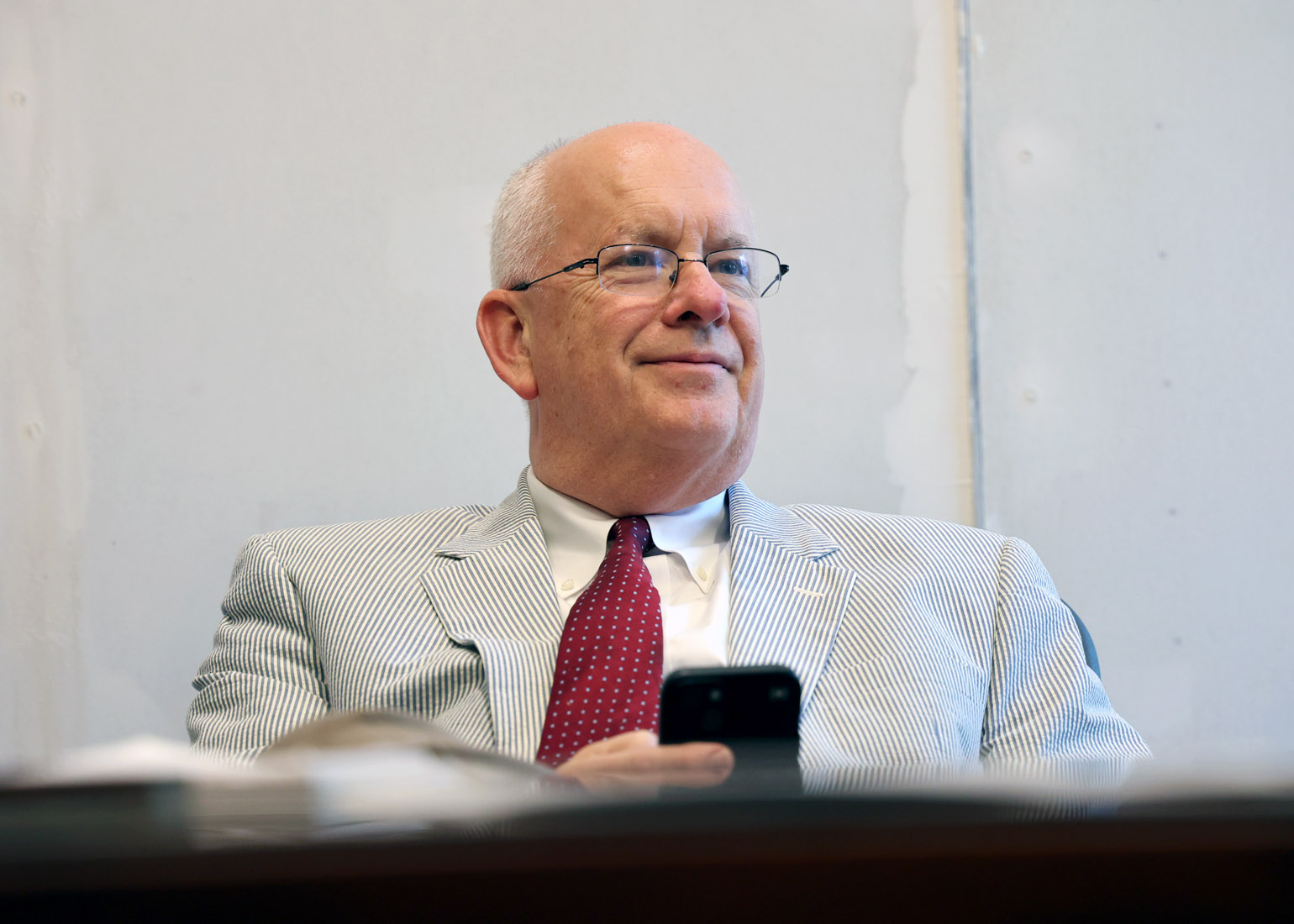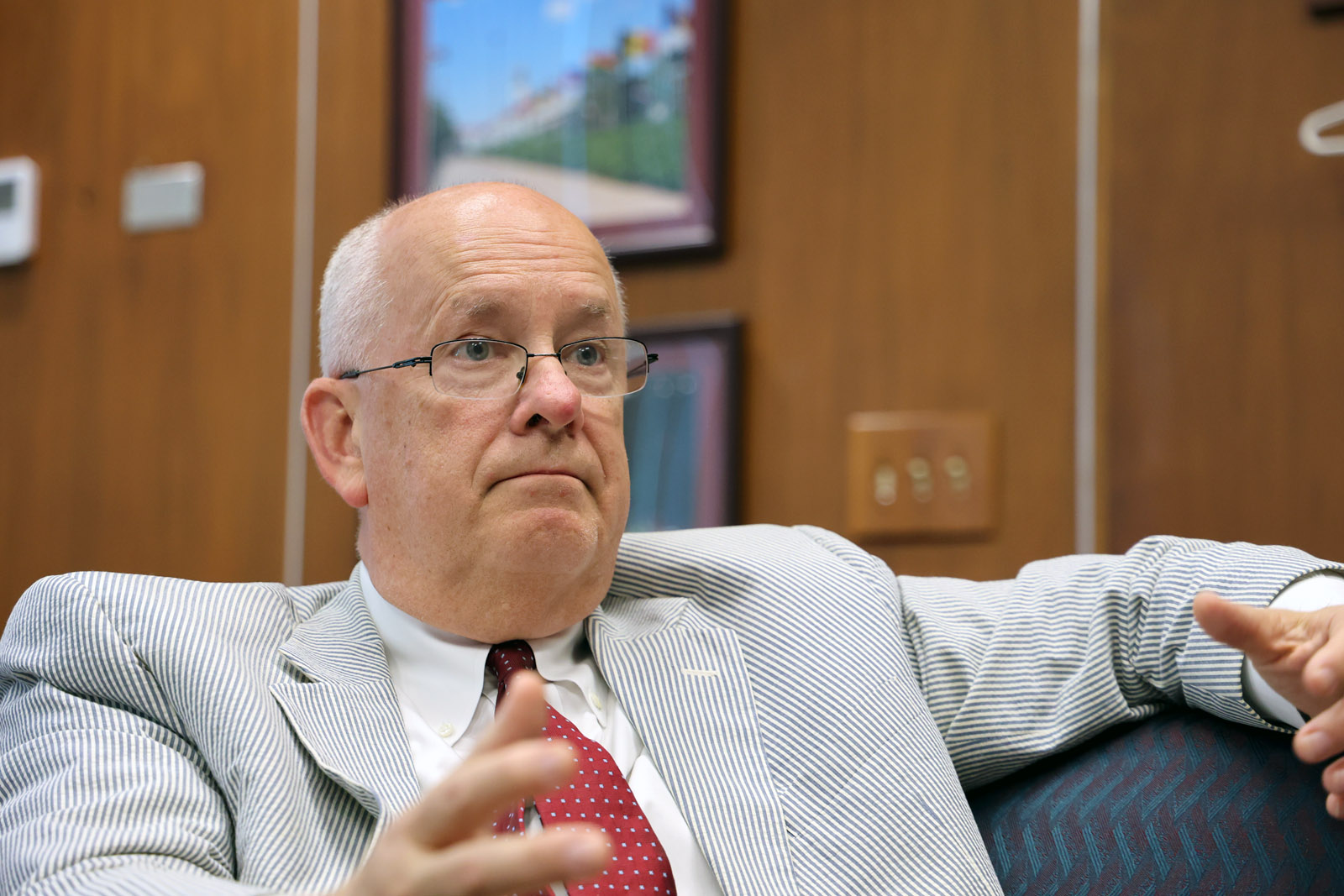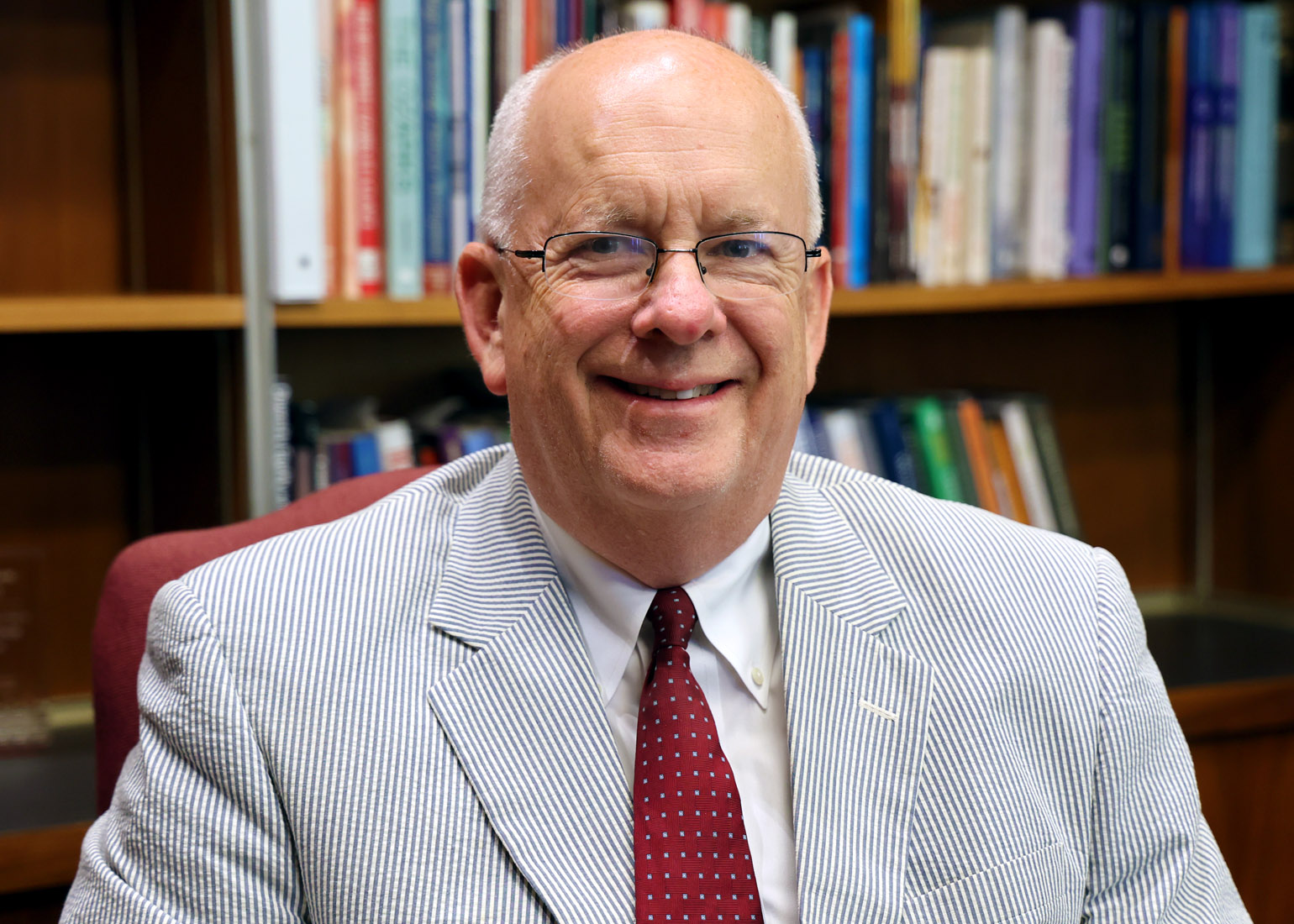Clif Smart was an unconventional choice to be the 11th president of Missouri State University — and he provided campus and community leadership in unconventional ways.
As he prepares for his final day in office on Friday, June 28, he took time with the Hauxeda to reflect on his leadership style, the challenges and rewards of the job, and of his deeper thoughts about work, faith and life.
“You know, I tell people kind of a lesson I've learned in life is you don't have to map everything out. Because it's going to change. You know, I never thought I was going to be president of a university — that wasn't on the agenda. But you have to be open to opportunities. And if you are, look what kind of amazing experiences you can have.”
Smart's last day is almost exactly 13 years after his first day, June 27, 2011, when the MSU Board of Governors asked him to step in following the failed term of James Cofer, who resigned under fire after 10 months. Smart was MSU's general counsel, having served about four years following nearly two decades in private practice, most of that with The Strong Law Firm in Springfield as a product liability attorney. He served in the U.S. Army after receiving his law degree from the University of Arkansas in 1986.
He had no academic background, as is expected of most university presidents. The Board of Governors asked him to serve in an interim role, and quickly discovered they had the man to hold the job permanently.
Under Smart's leadership, MSU flourished. Enrollment grew. On-campus diversity increased. Fundraising success led to new buildings, and establishment of new degree programs, including the first doctoral degree programs.
He also understood the “town and gown” relationship better than most, having been on both sides here in Springfield.

Smart also was unconventional in his use of social media to interact directly with students, staff and the community.
He joined Twitter — now X — in January 2013 and shortly after began a series of posts called the “Sunday quote,” in which he cites a quotation from historical figures, literature, music and even local leaders.
With his final Sunday quote on June 30, he will have shared nearly 600 quotations (among nearly 20,000 posts on X in his 11+ years on the platform).
Here, lightly edited for brevity, Smart reacts to some of those Sunday quotes he has shared, commenting and explaining some of why he thought the quotation was meaningful.
For his last Sunday quote, scheduled for June 30, he plans to repeat the quote that kicked it all off on Feb. 3, 2013.
On kindness and compassion: ‘An intentional strategy'
“So, ‘Les Miz’ (shorthand for “Les Misérables”) is one of my two most favorite shows, and we've seen it multiple times. … There has been an intentional strategy throughout the 11 years of me doing this … is to try to focus on kindness and compassion, and caring for other people as a leader. I mean, I've probably done 20 kindness quotes, and then many others that sort of connect with that, because it's more and more missing in public service. … That's important. The reason I like this quote so much, besides that it's from ‘Les Miz,’ is it connects kindness and love to believing in God and living a life of faith. And that's important to me as well.”
On work and dealing with challenges: ‘You can impact other people ... if you do it well'
“Work has been such an important part of my identity. I mean, first as an Army officer, second as a lawyer, third, as a university president. I mean, it's been really important to me. I get enormous fulfillment in doing good work and doing work well. And I think it's important, I think, you know, and one of the things I tried to convey with this is that a job is more than a job, it can be fulfilling and meaningful and you can impact other people through your work if you do it well. And that's been a great source of joy for me.”
“So work is hard, right? And I think, to be a good leader, you have to be positive. But you can't be Pollyanna. Right? I mean, the pandemic was awful. And you know, if you were trying to say the pandemic wasn’t awful as we were trying to figure out how to reopen the university and educate people that would be absurd. But you have to be positive in that we can figure this out together, we can do this, what we do is meaningful, we need to keep doing it. We can't give up and just stay in our homes, we've got to move forward. And so I think that positivity is really important. And it's most important when things are hard.”
On leadership: ‘There's no reward without risk'
“I'm a big fan of Teddy Roosevelt, he may be my favorite president, certainly top five. And you know, he has kind of that, bigger than life spirit and positivity. But he gets things done. And he overcomes challenges. And he looks for new challenges. The “River of Doubt” (a book by Candice Millard) was the story of him transversing the Amazon and almost dying — is one of my favorite books. It's unbelievable. I just think he's a really great example of an American president and what that office can mean, if done by the right person. I think he was a tremendous leader. And he took chances and there's no reward without risk. So he's one of my favorite people to read about and quote.”
“I like this quote from (President Ronald) Reagan because it focuses on the people in your team. When I talk about the things we've done at the university in the last 13 years, I worked very hard to make sure that people in the team that really did the work, get the credit for it: John Jasinski (provost) for the academic realignment; Steve Foucart (chief financial officer) and Matt Morris (vice president for administration and finance) for the work they've done on budgets; Brent Dunn (vice president for university advancement) on fundraising. You want to make sure that the people on the team are getting the credit for the work they've done. My job is to assemble the team and hold them accountable and encourage them and have their back when they take risk and fail. And then praise them when they are successful. And that's how you move things ahead.”
“I think that's a piece of the leader’s role. You know, I remember one time, kind of early on talking to Don Simpson who led our enrollment work for a long time. And Don was like, ‘Well, you know, there are fewer people going to college, we're going to bump down — we're probably going to have fewer than 2,500 people in our class this year.’ And I'd say Don, that's wrong. Everyone doesn’t bump down. There are winners and losers. And it's our job to figure out how we can be on the winning side of that. And I think that kind of changed how he was looking at things and that was kind of the year we bottomed out and then began growing again. And so I do think that's a part of the main leader’s role is to get people to realize they're more than they think they are. And they can do bigger and greater things than they've ever thought about. And then they go off and do it, and they've done it. But I have that little tiny role to get it started sometimes.”

On the pandemic: ‘Probably the only time ... that I didn't look forward to work'
“You know, probably the first four months of the pandemic, maybe the first six months, were the hardest this job ever was — probably the only time that I've had this job that I didn't look forward to work. It was really tough. And you know, this Winston Churchill quote, I'm probably talking to myself, about not losing courage and that we had to figure out a way to move on. I mean, I think March 22, we probably just closed the university that week, like March 20, was when it all came to an end.”
“I'm a big fan of Steve Edwards (then head of CoxHealth), and the public persona he took on during the pandemic. He was one of the people that helped Springfield get through the pandemic. I like to think I played a tiny little part, but Clay Goddard (who was then head of the health department) and (Mayor) Ken McClure, and Steve Edwards and Matt Morrow (Chamber of Commerce), and maybe to a lesser extent, Hal Higdon (Ozarks Technical Community College) and I and some others that all kind of pulled together to say, we've got to tell the truth, we've got to do the right thing. ...
“...We needed to buy time for the hospitals to ramp up to be able to manage hundreds of COVID patients, and they couldn't have done that at the beginning. And I remember a meeting in Ken McClure's office, it was Ken and Jason Gage (city manager), and Matt Morrow and Clay Goddard and me — and Ken wanted our input in deciding: Were we essentially going to close down Springfield? And the answer was we needed to for a short period of time, so that we could let the hospitals get ready for this. And I think that decision, and I really admired Ken for having the guts to make it because everyone didn't think it was a great idea. I think that helped us get over that first six, eight months, hump, so that then the hospitals were ready to manage this. ... I think we did a pretty good job. And I was glad to be a part of it.”
On public service: ‘Our lives are better ... when we serve others'
“As you and I have talked several times, maybe it's an old fashioned belief now, but I truly believe in public service and I believe that our lives are better and more fulfilling and happier when we serve others. And sometimes it takes courage to do that.”
“I'd forgotten the Jon Stewart quote. But it's a good one. …
“I think Springfield has made lots of progress in becoming a more welcoming place for people of all backgrounds. And I think the university's led in that, and I'm really proud of that. And I think it's important as we go forward, that we continue to do that, even if we have to adjust how we do it slightly, or even if we change what we talk about, or what we call things, it's really important, on all kinds of levels that, you know, we're a public university. I don't care who you are, you'd be the most conservative person in the world, the most liberal person in the world. English in your first language, you're in a minority and a dozen different character categories. It could be you're an Evangelical Christian, it could be that you're Muslim, it could be that you're gay, it could be you're a veteran, it could be you're 53 years old, single mother trying to go back to school, I don't care what your demographic is, we're a public university, you ought to be able to be successful here, you ought to be able to work here. You ought to be able to find community here. And that's all in my mind diversity work is. And we got to keep doing that. And I think we will keep doing that.”

Reflections on life: ‘You have to be open to opportunities'
“I periodically do quotes that I think that if 18 to 22 year olds read them, maybe it causes them to think about something. And so, ‘live the life you have imagined.’ You know, don't be scared, take risk. You know, I tell people kind of a lesson I've learned in life is you don't have to map everything out. Because it's going to change. You know, I never thought I was going to be president of a university — that wasn't on the agenda. But you have to be open to opportunities. And if you are, look what kind of amazing experiences you can have.”
“I think sometimes people need to hear — go do it. Right? As Nike said: just do it. Don't worry about what your friends are doing or thinking or what's on social media. What's in your heart? Try it. Don't be afraid.”
“Two thoughts on this one. I love to travel. What I have found, the longer I've gone, is the best experiences are with other people. When we go to our sister city in Mexico that you're traveling with your great friends; when you go to Europe, you're on a choral trip with 30 other people that love music and the university; when we're going on this cruise this fall with the Alumni Association that we're connecting up with four other couples beforehand and two afterwards and planning things that we're all gonna do together. It just makes travel for me so much more important. … People and relationships and that interaction are the most important thing to me. I love seeing and learning about things. I love the history that we're going to see and music and great food. All of that is better with really good friends.
“And my best friend and the best travel partner I have is Gail, and we're looking forward to lots of great adventures over the next few years. That's it. That's good. I love that.”


